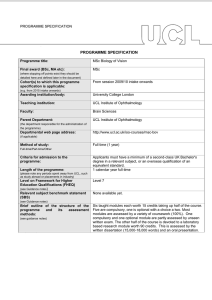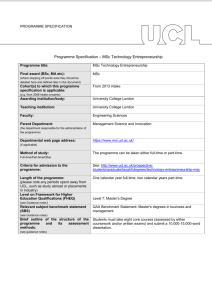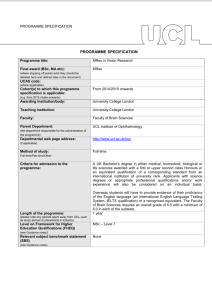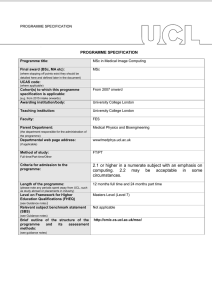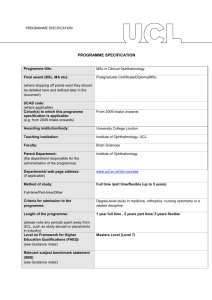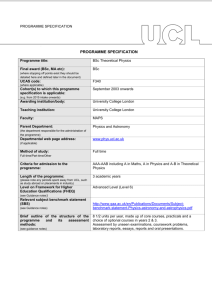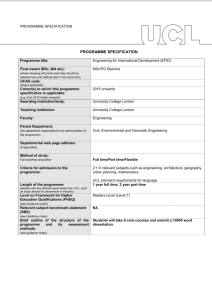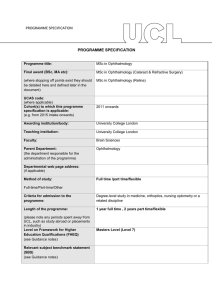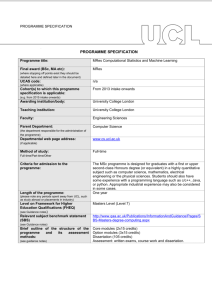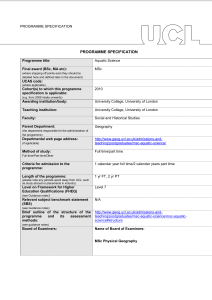MSc Cancer - University College London
advertisement
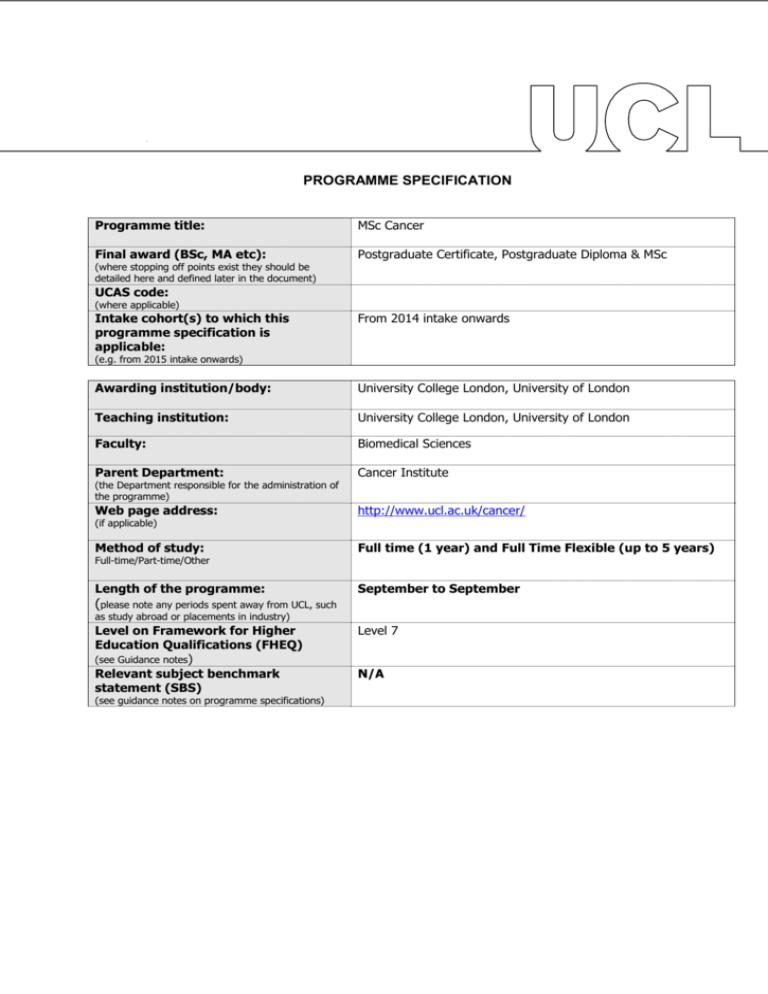
PROGRAMME SPECIFICATION Programme title: MSc Cancer Final award (BSc, MA etc): Postgraduate Certificate, Postgraduate Diploma & MSc (where stopping off points exist they should be detailed here and defined later in the document) UCAS code: (where applicable) Intake cohort(s) to which this programme specification is applicable: From 2014 intake onwards Awarding institution/body: University College London, University of London Teaching institution: University College London, University of London Faculty: Biomedical Sciences Parent Department: Cancer Institute Web page address: http://www.ucl.ac.uk/cancer/ Method of study: Full time (1 year) and Full Time Flexible (up to 5 years) Length of the programme: September to September (e.g. from 2015 intake onwards) (the Department responsible for the administration of the programme) (if applicable) Full-time/Part-time/Other (please note any periods spent away from UCL, such as study abroad or placements in industry) Level on Framework for Higher Education Qualifications (FHEQ) (see Guidance notes) Relevant subject benchmark statement (SBS) (see guidance notes on programme specifications) Level 7 N/A Brief outline of the structure of the programme / its assessment: (see guidance notes on programme specifications) Board of Examiners: Professional body accreditation (if applicable): The course will have 7 required modules in total. There are two core modules; one on cancer biology and genetics and one on cancer therapeutics. Together they are worth 60 credits. These will each be assessed by an unseen written exam (50%) and coursework (50%). Additionally, there are 4 specialist modules worth 15 credits each. The specialist modules will each have formative assessments that are not recorded, along with one summative assessment each which is worth 100% for each module. These will take the form of an essay, an examination or a poster presentation . The final part of the course is one of the following: laboratory based research project/clinical trial project/systems biology or informatics project. This is worth 60 credits. A 10,00012,000 word dissertation and oral presentation at the midpoint of the research project will be used to assess the research-based projects. Name of Board of Examiners: MSc Cancer Board of Examiners Date of next scheduled accreditation visit: N/A EDUCATIONAL AIMS OF THE PROGRAMME: The programme will provide students with an in-depth look at the disease processes which lead to cancer. Students will learn the approaches taken to predict, detect, monitor, and treat cancer. Students will also get a strong grounding in the various research methods and techniques used to study and treat cancerous cells. PROGRAMME OUTCOMES: The programme provides opportunities for students to develop and demonstrate knowledge and understanding, qualities, skills and other attributes in the following areas: A: Knowledge and understanding Knowledge and understanding of: - The current understanding of the biological basis of cancer at the molecular, cellular, organ system and whole organismal level - The historical and current treatment therapies for various cancers, and how their efficacy is assessed - Laboratory techniques used to identify, monitor and study cancer and its treatments Teaching/learning methods and strategies: Lectures, the course textbook: 'The Biology of Cancer' (Robert A. Weinberg, 2006), journal articles, self-study, database mining, wet-lab based experiments/studies, clinical trial evaluations, discussions/tutorials, etc. Assessment: Within module marked assignments, projects, reports, posters or presentations and unseen written exams. Written dissertation and oral presentation for research project module. B: Skills and other attributes Intellectual (thinking) skills: - Be able to critically read and evaluate scientific literature Be able to conceptually design a research project, clinical trial analyses or informatics project C: Skills and other attributes Practical skills (able to): - Use various scientific databases - Keep a laboratory notebook/records - Write a scientific dissertation D: Skills and other attributes Transferable skills (able to): - Basic statistical competencies - Proficiency in various computer software (e.g. word processing, citation based, spreadsheet, graphical presentations) - Discussion and oral presentation skills Teaching/learning methods and strategies: Group discussions, critical reading of journal articles, experimental/clinical trial analyses/informatics projects design, literature reviews. Assessment: Within module marked assignments, projects/portfolios, reports or presentations and unseen written exams. Written dissertation and oral presentation for research project module. Teaching/learning methods and strategies: Lectures, tutorials, laboratory training, assigned reading and self-learning Assessment: Assignments, informal monitoring by lab/project mentor, research project oral presentation and written dissertation Teaching/learning methods and strategies: Lectures, assignments, preparation of presentations, preparation of research project report, group discussions Assessment: Assignments, research project report, unseen written exams The following reference points were used in designing the programme: the Framework for Higher Education Qualifications: (http://www.qaa.ac.uk/en/Publications/Documents/qualifications-frameworks.pdf); the relevant Subject Benchmark Statements: (http://www.qaa.ac.uk/assuring-standards-and-quality/the-quality-code/subject-benchmark-statements); the programme specifications for UCL degree programmes in relevant subjects (where applicable); UCL teaching and learning policies; staff research. Please note: This specification provides a concise summary of the main features of the programme and the learning outcomes that a typical student might reasonably be expected to achieve and demonstrate if he/she takes full advantage of the learning opportunities that are provided. More detailed information on the learning outcomes, content and teaching, learning and assessment methods of each course unit/module can be found in the Departmental course handbook. The accuracy of the information contained in this document is reviewed by UCL and may be checked by the Quality Assurance Agency for Higher Education. Programme Organiser(s) Name(s): Date of production: Date of review: Date approved by Chair of Departmental Teaching Committee: Date approved by Faculty Teaching Committee Dr Julie Olszewski (Programme Leader) May 2012 November 2015 November 2015 November 2015
